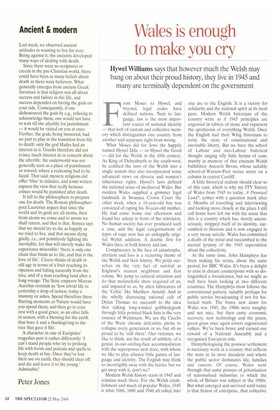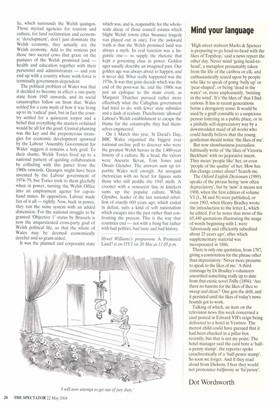Wales is enough to make you cry
Hywel Williams says that however much the Welsh may bang on about their proud history, they live in 1945 and many are terminally dependent on the government
From Moses to Hywel, and beyond, legal codes have defined nations. Next to language, law is the most important source of national identity
— that web of custom and collective memory which distinguishes one country from another and separates right from wrong.
What Moses did for Jews the happily named Hywel Dda — or Hywel the Good — did for the Welsh in the 10th century. As King of Deheubarth in the south-west, he codified the laws of the Welsh into a single system that also incorporated some advanced views on divorce and women's inheritance rights. Hywel's laws defined the national sense of mediaeval Wales. But modern Wales supplied a grimmer legal landmark in Swansea Crown Court the other week, when a 16-year-old boy was convicted of raping his 36-year-old mother. He had come home one afternoon and found her asleep in front of the television. No human society has ever produced such a case, and the legal categorisations of types of rape now has an unhappily original Welsh addition. A double first for Wales then, in both history and law.
Complacency in the face of catastrophe, attrition and loss is a recurring theme of the Welsh and their history. We pride ourselves on the very fact of survival as England's nearest neighbour and first colony. We jump to cultural attention and do that melancholic show required of us, and imputed to us, by alien fabricators of the 'Celtic' like Matthew Arnold. And in the wholly distressing national cult of Dylan Thomas we succumb to the idea that talking long-winded gobbledygook through little pointed black hats is the very essence of Welshness. We are the Czechs of the West: chronic defeatists, prone to collapse every generation or so, but oh so proud to be 'still there'. Our victories, we like to think, are the result of subtlety, of a genial, in-our-smiling-face accommodation with the superpower next door, with whom we like to play allusive little games of language and identity. The English may think us incorrigibly away with the fairies, but we get away with it, don't we?
Modern Welsh history starts in 1945 and remains stuck there. For the Welsh establishment and much of popular Wales, 1945 is what 1066, 1688 and 1940 all rolled into one are to the English. It is a victory for solidarity and the national spirit at its most pure. Modern Welsh historians of the country write as if 1945 principles are engraved in tablets of stone and represent the apotheosis of everything Welsh. Once the English had their Whig historians to write the story of constitutional and inevitable liberty. But we have the school of Labour and neo-Labour historical thought singing silly little hymns of community in memory of that eminent Welsh bullshitter Aneurin Bevan, whose suitably school-of-Warsaw-Pact statue struts on a column in central Cardiff.
A little historical realism should clear us of this cant, which is why my ITV history of Wales from 1945 to today, A Promised Land?, comes with a question mark after it. Months of travelling and interviewing and looking more closely at the place I still call home have left me with the sense that this is a country which has, mostly unconsciously, stripped itself of its identity, succumbed to illusions and is now engaged in a very messy suicide. Wales has committed a death of the mind and succumbed to the mental tyranny of the 1945 superstition about the collectivity.
At the same time, John Humphrys has been making his series, about the same period, for BBC Wales. It's been a delight to exist in distant counterpoint with so distinguished a broadcaster, but we might as well have been looking at two different countries. The Humphrys show follows the conventional pattern, suitable perhaps for public service broadcasting if not for historical truth. The brave new dawn for Wales was 1945, the 1980s were naughty and not nice, but then came economic recovery, new technology and the green, green grass once again covers regenerated valleys. We've been brave and earned our reward of a National Assembly and a recognised European role.
Demythologising the postwar settlement is necessary work in a country that reflects the state at its most decadent and where the public sector dominates life, families and careers. Of course, Wales went through that same process of privatisation of nationalised industries to which the whole of Britain was subject in the 1980s. But what emerged and survived until today is that fiction of enterprise, that collective
lie, which surrounds the Welsh quangos. Those myriad agencies for tourism and culture, for land reclamation and economic 'development', don't just dominate the Welsh economy, they actually are the Welsh economy. Add to the noxious pot those two sacred cows that graze on the pastures of the Welsh promised land — health and education together with their personnel and administrators — and you end up with a country whose work-force is terminally government-dependent.
The political problem of Wales was that it decided to become in effect a one-party state from 1945 onwards, and its social catastrophes follow on from that. Wales settled for a cosy myth of how it was living up to its 'radical' past, but in fact the country settled for a quiescent torpor and a belief that everything the masters ordained would be all for the good. Central planning was the key and the preposterous strategies for economic development spawned by the Labour 'Assembly Government for Wales' suggest it remains a holy grail. To their shame, Welsh Tories lived up to a national pattern of quisling collaboration by colluding with this patter from the 1980s onwards. Quangos might have been invented by the Labour government of 1974-79, but Tories took to them gleefully when in power, turning the Welsh Office into an employment agency for cap-inhand mates. In opposition, Labour made fun of it all — rightly. Now, back in power, they run the same system with an added dimension. For the national struggle to be granted 'Objective l' status by Brussels is now the unquestioned cross-party goal of Welsh political life, so that the whole of Wales may be deemed economically derelict and so grant-aided.
It was the planned and corporatist state which was, and is, responsible for the wholescale decay of those council estates which blight Welsh towns (that Swansea tragedy was played out in one). For the awkward truth is that the Welsh promised land was always a myth. Its real function was a linguistic one — to supply the rhetoric that kept a governing class in power. Golden ages usually describe an imagined past. Our golden age was always about to happen, and it never did. What really happened was the 1970s. It was that grim decade which was the end of the post-war lie, and the 1980s was just an epilogue to the main event, as Margaret Thatcher pursued rather more effectively what the Callaghan government had tried to do, with fewer state subsidies and a dash of realism. Thatcherism 'allowed' Labour's Welsh establishment to escape the blame for the catastrophe they had themselves engineered.
On 1 March this year. St David's Day, BBC Wales organised the biggest ever national on-line poll to discover who were the greatest Welsh heroes in the 1,400-year history of a culture. By a head, the victors were Aneurin Bevan, Tom Jones and Owain Glyndwr. The answers sum up tripartite Wales well enough. An arrogant rhetorician with no head for figures suits those who still peddle the 1945 myth. A crooner with a senescent line in knickers sums up the popular culture. While Glyndwr, leader of the last national rebellion of exactly 600 years ago, which ended in defeat, suits a kind of soft nationalism which escapes into the past rather than confronting the present. This is the way that countries end — not with a bang but rather with bad politics, bad taste and bad history.
Hywel Williams's programme A Promised Land? is on ITV1 on 20 May at 11.05 p.m.



















































































 Previous page
Previous page